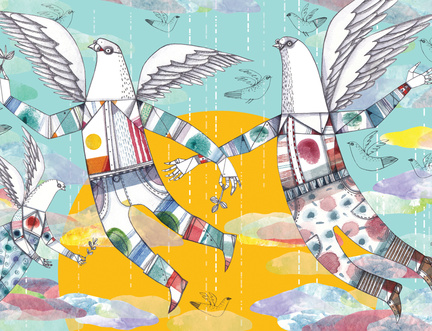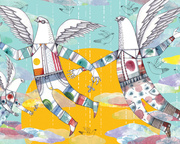A Sentence for Freedom
By Haydeh Ravesh

In 2018, we commissioned 51 authors from 25 countries to write essays exploring ideas about freedom for The Freedom Papers, a publication produced in partnership with Gutter Magazine. Read on for Haydeh Ravesh's essay, and visit guttermag.co.uk to purchase a copy of The Freedom Papers.
It was late November 1985 when my two-year sentence in Evin, Iran's notorious prison, finished.
A few days earlier, I had been called into the prison's main office. Before leaving their ward, prisoners were first blindfolded, so each of us kept a blindfold handy for whenever we left the ward; also, female prisoners always had to don a long black chador to cover us from head to toe. I got ready and followed the guard for about half a mile, all through the vast prison’s outdoor area. On either side of the road, from under my blindfold I could see the narrow garden: most of the roses were nicely trimmed, though they had no flowers or leaves. But the dahlia blooms – they were a riot of purple, lilac and yellow. I tilted my head back to have a better view of the taller flowers, and pulled my blindfold up just a little more to enjoy the sight of white clouds against a blue sky. I could hear sparrows making their sweet noises. The man turned round to check me, and all of a sudden shouted: ‘Pull down the bloody blindfold – I’m taking you to the office, you’re not on a picnic!’ And in a deeper voice he added: ‘How nasty and tough you are!’
When we arrived at the office building I was ordered to sit in the corridor on the floor. I waited, for over two hours, to be called into a large room, at the far end of which a man sat at a big desk, busy with his folders. I stood waiting till he said, ‘Take off your blindfold and sit down’, all the while keeping his eyes on his papers. Then, at last raising his head, he told me that my sentence was finished. ‘You will be released from prison, if you will sign this form.’
I was handed a piece of paper and a pen. The form, actually a block of text, I was to rewrite and then sign. I already knew something of the content of this text. It read:
‘I am ashamed of my past life. I am ashamed of supporting destructive and evil organisations. I promise that I will never support these subversive organisations, or any member of them. Otherwise I am deserving of the highest punishment without any recourse to court.’
I knew what this highest punishment was: a death sentence.
I read the text, and put down the pen. I asked him, why should I sign this form? He said that it is compulsory, and that every single prisoner had to sign it. I replied that this makes it an inquisition, because it was about my beliefs, and that no-one should be questioned or restricted because of her or his beliefs. ‘But you were against the government and Islamic values’, he said. I answered, ‘I have done something that you call a crime – although I strongly disagree with you. And according to your judge, in your court, the punishment was a two-year sentence and stay in prison; those two years have finished, so now we have nothing on one another.’
The conversation went on and on. Eventually he ended it. He swore and shouted, reminding me that if I did not write out that piece of text, I would stay in Evin prison for ever. I put my blindfold back on and left the room. Again, I waited a long time, sitting on the corridor floor. Aged 28, I was full of desires, hopes and plans for my life.
There were many prisoners who had refused to write out the text and were kept in Evin – or other political prisons – for years. In some cases, the prison officers were asked to report minor ‘infringements’ – behaviour such as not listening to the women police guards on the ward, or building up 'political' relationships with other prisoners. They'd then take the 'offenders' to the prison court and give out further sentences. It was very possible they might send you to a different prison in order to break any friendships.
I was occupied with all these thoughts when a police guard called me to go back to my ward. This time, I followed him, still peeking at the garden and flowers but with a sad and heavy heart, unsure about a future over which I had absolutely no control. Now, after three-and-a-half years incarcerated, held for eighteen months under interrogation then a two-year sentence, was I to endure unknown further years in prison? I was wondering how to break the news to my parents.
They took me back to the prison ward and told me that I would stay there until I changed my mind. I was held there for another two years, till December 1988.
There was no consideration of civil rights. In that political atmosphere, not only did you have no right to talk or write about your ideas and beliefs, but even just to have certain books – even university course books – and some newspapers, was a crime. For this, you would get an extra sentence.
Of our ward of about 230 women prisoners, some 65–70 had, like me, finished their first sentence and were called ‘freedom-fellows’ (bache haaie-azaadie). There were a number who had never been sentenced at all. These were people either arrested randomly, or alongside other political activists, perhaps their own relations, especially sisters or brothers. So they, on principle, also hadn’t written out and signed the ‘release’ text.
After the big massacre of summer 1988, many Iranians who were in Europe and America contacted Amnesty International and other human rights organisations within the UN to protest, and obtain the release of prisoners like myself. In some cities there were hunger strikes: in London, one was held in Trafalgar Square.
In Iran itself, families also protested, worried for their relatives. They asked the moderates in the government to release all political prisoners, especially those whose sentences had officially finished.
I was sentenced for two years, for the freedom of my ideas; and for two more, for not writing the sentence they wanted in exchange for my freedom.
Copyright © 2018, Haydeh Ravesh. All rights reserved.
Supported by the Scottish Government’s Edinburgh Festivals Expo Fund through Creative Scotland.
Look, Listen & Read
- 2026 Festival:
- 15-30 August
Latest News
 Major new partnership with Celtic Connections
Major new partnership with Celtic Connections




